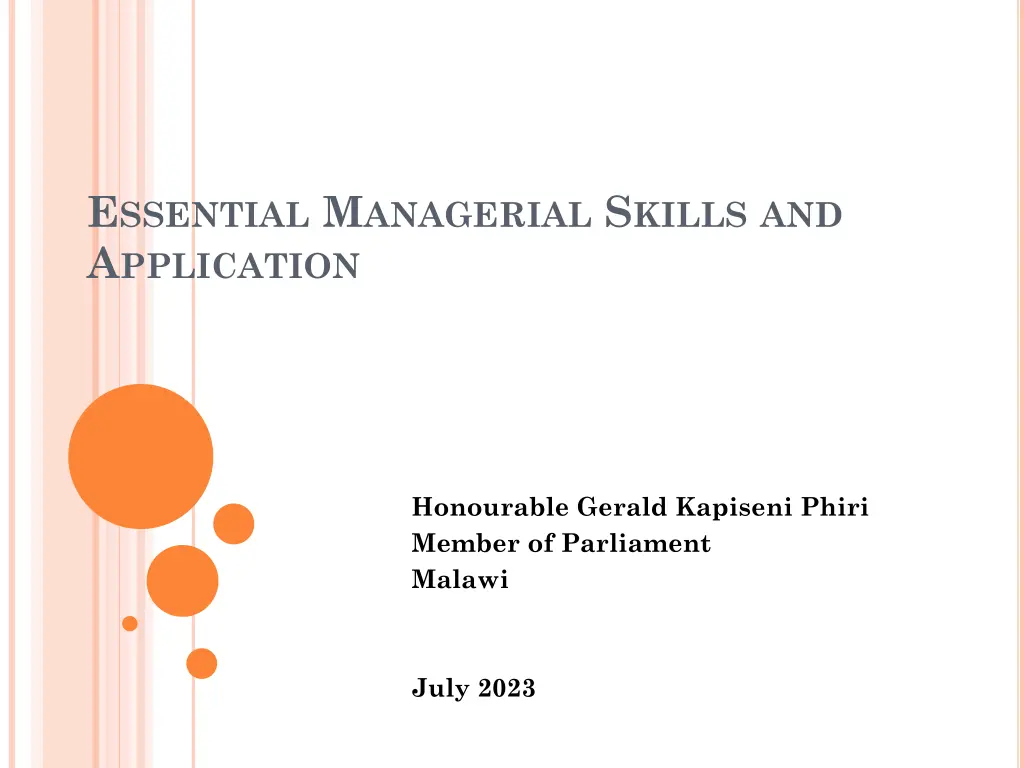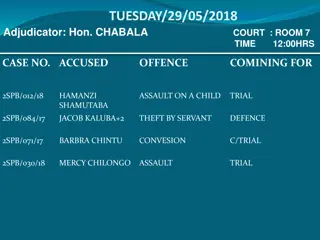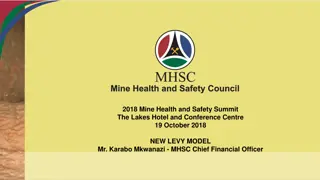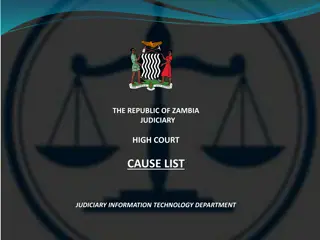
Mastering Managerial Skills for Organizational Success
Explore the dimensions of essential managerial skills for effective organizational management, including communication, problem-solving, and decision-making. Learn how strategic thinking plays a vital role in modern leadership for achieving organizational goals.
Download Presentation

Please find below an Image/Link to download the presentation.
The content on the website is provided AS IS for your information and personal use only. It may not be sold, licensed, or shared on other websites without obtaining consent from the author. If you encounter any issues during the download, it is possible that the publisher has removed the file from their server.
You are allowed to download the files provided on this website for personal or commercial use, subject to the condition that they are used lawfully. All files are the property of their respective owners.
The content on the website is provided AS IS for your information and personal use only. It may not be sold, licensed, or shared on other websites without obtaining consent from the author.
E N D
Presentation Transcript
ESSENTIAL MANAGERIAL SKILLS AND APPLICATION Honourable Gerald Kapiseni Phiri Member of Parliament Malawi July 2023
OUTLINE OF THE PRESENTATION Introduction of Managerial Skills in an Organizations. Dimensions of Managerial Skills. Communication and Interpersonal Skills. Communication Media and Channels Problem-solving and Decision Making skills Development of Managerial Skills Strategic Thinking in Organizations Conclusion
INTRODUCTION This presentation tries to discuss the subject of essential managerial skills as it applies to strategic management of organizations in the 21stCentury. The argument advanced is that modern management of organizations requires that the managers should have an in-depth understanding principles of management so that their respective managerial skills could be employed for effective and efficient running of the organizations. of the basic It discusses various dimensions of managerial skills and provides guidance on how to utilize each skill towards triggering organizational performance.
THE CONCEPT OF MANAGERIAL SKILLS. A particular set of capabilities someone in a management position should possess to run an institution or department effectively. These skills enable them to perform executive- level tasks so that the institution can excel and get through any problems without chaos. Additionally, these skills help managers relate to their subordinates, creating a far better work environment where processes can run smoothly.
DIMENSIONS OF MANAGERIAL SKILLS Communication and Interpersonal Skills Listening Skills We want to communicate effectively Problem Solving Skills Lots of dimensions which are core to managing organizations Managerial Skills. effectively. Technical Skills Decision Making Skills How do we make decisions and guided by what?
COMMUNICATION AND INTERPERSONAL SKILLS Successful managers need good communication skills Effective communication can unify and motivate a team. Communicate in ways that make your team comfortable. Using excellent grammar and spelling skills. Good managers adapt their own communication style to the situation or person. Helps to avoid confusion, so everyone is on the same page at all times. Strong communication = completion of tasks on time, achievement of success and reaching of overall vision and goals
EXAMPLES OF COMMUNICATION CHANNELS Examples of verbal communication - phone calls, in person or online chat Examples of written communication - email, SMS, social media and online platforms. Any other examples?
LISTENING SKILLS SEEK FIRST TO UNDERSTAND BEFORE BEING UNDERSTOOD. To better develop your communication skills and empathy toward others, be an active listener. Active listening means being engaged and acting on what you listen to, not just hearing others. A good manager values, respects and appreciates their team's insights and ideas by fully hearing what they share. Listening more also helps you understand critical information better, and it can build connections and trust when problems may arise
PROBLEM-SOLVING SKILLS Problems often arise in every education institution. An excellent manager knows how to identify these problems and resolve them before any damage can be done. Tactfully looks at an issue from all sites, garner feedback, and prioritize based on the information they receive. Find the best solutions to these problems with the least amount of costs, bad press or effect on business processes. Great managers think ahead, expect risks, and brainstorm solutions to determine the best way to go about resolving these issues. Include conflict resolution
TECHNICAL SKILLS Technical skills refer to the knowledge and proficiency in performing specific processes. It involves knowing how to use particular tools, techniques, and software to achieve the best results. Managers need the technical skills to perform business tasks effectively. E.g. an education manager needs to know how to use digital tools and be able to teach these skills to subordinates. methods, procedures, and
ADDITIONAL SKILLS REQUIRED WHEN APPLYING TECHNICAL SKILLS 1. Coaching Coaching is a great way to share your knowledge and support your team s growth. Builds confidence and intellectual capital. 2. Directing Directing can be in the form of delegating or reviewing work, acting as a form of quality control, or managing timelines. 3. Emotional intelligence Includes exercising fairness, empathy and sensitivity. Helps to identify a coworker who is feeling overwhelmed or burned out. A compassionate leader gives support and may put provisions in place to help a struggling employee, such as offering a work-from- home day Also means having the self-awareness to recognize their own emotions and reactions, be objective & show restraint & understanding.
LEADERSHIP SKILLS There is a big difference between being a boss and being a leader. A boss is someone who gives instructions and watches as their employees do the work. A leader is someone who not only gives instructions but also works alongside their subordinates to achieve maximum success. They provide guidance, feedback, and do some of the heavy lifting themselves. offer helpful
LEADERSHIP SKILLS CONT. Not all managers are natural leaders, so it s important for managers to work on their leadership abilities. Different management styles, but always strive to lead by example. Influential leaders inspire through their behavior. They set the tone for the team, reach out for feedback, acknowledge their team s strategically. When managers are willing to work with their subordinates, they will gain the respect of their associates and will be outcomes. and motivate others efforts, and delegate able to achieve better
OTHER SKILLS THAT CORRELATE WITH LEADERSHIP SKILLS Collaboration and Coordination It is a leader s responsibility to facilitate collaborative working environments and to be strong collaborators themselves. Ideally, these teams work independently, and the manager ensures that they have the resources and skills needed to achieve their goals. Time management Involves being on time, knowing what to work on when, how to prioritize projects and setting realistic timeframes to complete tasks. Delegation Assigning tasks to others and giving them the authority to accomplish those tasks. Motivation An outstanding manager can empower and inspire their team by adopting the right motivators. Recognition Praising the team helps group morale, keeps employees engaged and makes them more likely to stay at that workplace.
ORGANIZATIONAL AND PLANNING SKILLS Requires seeing both the big picture and the finer details at the same time Have the ability to outline a project, assign tasks, organize meetings, foresee obstacles and find creative solutions; show stakeholders a plan to succeed & meet deadlines They have to be able to prioritise tasks from most to least significant since plans often change. Allocate adequate time to specific duties so that subordinates have enough time to complete them. They must also stay calm and maintain a level head during stressful situations.
PLANNING ALSO INVOLVES STRATEGIC THINKING Strategic thinking is the ability to plan for the future, generate ideas and implement strategies for success. Good managers consider likely scenarios, plan for potential complications and find ways to mitigate or avoid risk
DECISION-MAKING SKILLS Maake decisions that ll benefit the institution as a whole and help it attain its goals. May involve tough choices, such as temporary closure of an institution, and more (any more examples?). Effective decision-making consideration without overthinking or becoming sidetracked by minor details. Helps managers find threats and take the appropriate course of action regardless of how difficult it is. Wrong decisions are part of the process. But they need to learn from their mistakes to improve their decision-making skills. requires thoughtful opportunities and detect
CONCEPTUAL SKILLS & FUNCTIONAL SKILLS Conceptual skills Helps managers to see the big picture Allow managers to visualise the institution as a whole and coordinate and integrate different parts to work together to achieve the best outcomes. Thus, managers will know what tools, resources, and processes the institution needs to incorporate into its operations to stand out within its industry. Functional skills An effective manager knows the various software, operational tools and equipment used within their team and institution. E.g. computer programs, spreadsheets and organizational methods. Builds credibility and allows you to help during an emergency or unexpected situation.
CONCEPTUAL SKILLS INCLUDE ADAPTABILITY The world constantly evolves, and a manager's willingness to grow along with it keeps competitive and innovative. A good manager is often open to new ideas or ways of doing things and views change as rather than an obstacle. them relevant, an opportunity
HOW TO DEVELOP YOUR MANAGEMENT SKILLS Though there are many ways to develop your skills as a manager, the key is participation. Here are some ideas for how to get started and where to put one s energy: Take time to reflect Seek out feedback Volunteer to lead an initiative or project Find opportunities to coach your peers Celebrate your peers wins Tune in and participate in meetings Look to mentors and leaders you admire 1. 2. 3. 4. 5. 6. 7.
CONCLUSION AND RECOMMENDATIONS The presentation has discussed various aspects of managerial skills which are core to the effective performance of the organizations. It has advanced an organizational managers ought to understand the complexity of organizational management if they were to manage their organizations effectively. It has further suggested that managers ought to understand principles of leadership if they were to achieve their targets with higher levels of motivation amongst employees. It has emphasized the need to develop organizational strategic thinking as a core issue that triggers innovation and critical analysis of issues as they emerge. narrative that modern
Zikomo Kwambiri Thank You So Much






















